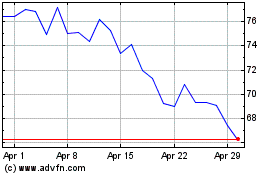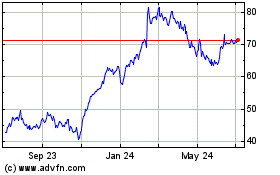By Preetika Rana and Heather Haddon
Restaurants' increasing dependence on companies like DoorDash
Inc. and Uber Technologies Inc.'s Eats during the coronavirus
pandemic has inflamed their frustrations with the delivery services
and prompted some eateries to strike back.
For years, smaller restaurants have bristled at the commissions
food-delivery apps charge, up to 30% in some cases, an amount
particularly painful these days, as many dining rooms have been
emptied by the pandemic. In response, some restaurants are looking
to decrease their reliance on delivery giants by siding with
smaller firms that offer more favorable rates, encouraging
customers to do pickup orders and training staff to double as
drivers.
The delivery companies, which also include Grubhub Inc. and
Postmates Inc., say they have offered discounts to customers to
encourage more orders during the crisis. However, the pandemic
comes as many of the bigger delivery companies are facing pressure
from investors to deliver profits.
Restaurant chains typically have stronger negotiating power. For
example, McDonald's Corp. lowered the commission it pays Uber Eats
down to about 15% of each order. That is a luxury small restaurants
don't have, especially without in-store dining, which helped
restaurants offset thin margins on deliveries.
"We're bleeding," said Richard Hoban, co-owner of Verdine, a
Houston-based vegan restaurant that pays Uber Eats and DoorDash a
30% commission on each order.
Verdine's sales in the week through March 21 -- the first week
after major U.S. cities imposed lockdowns -- plunged 65% compared
with a typical week. To-go orders accounted for most of the sales
volume. The restaurant earned just about enough to pay employees
but couldn't cover rent and other costs after accounting for app
commissions, Mr. Hoban said. Before the pandemic, to-go sales
accounted for just 8% of weekly sales.
Verdine severed ties with DoorDash -- which it said brought the
restaurant fewer orders than Uber Eats -- and launched a
social-media campaign to promote Favor Delivery, a lesser-known
local app that waived commissions for restaurants.
"We'll remember the way they treated us long after this is
over," said Mr. Hoban, who said he plans to stick with Favor
Delivery, a subsidiary of Texas-based H-E-B LP.
Representatives for DoorDash, Uber Eats, Postmates, and Grubhub
declined to comment on the restaurants' specific complaints,
instead pointing to a list of measures they have taken, aimed at
driving more orders for small restaurant partners.
In the first week after several major cities started ordering
people to stay home, U.S. consumers spent 10% more on orders via
DoorDash, Uber Eats, Grubhub and Postmates compared with the
previous week, according to credit and debit transactions analyzed
by market research firm Edison Trends.
Mattia Cosmi, who runs the Italian Homemade Company in San
Francisco, estimated promotions on DoorDash and other apps drove
20% of delivery volume since the city imposed a shutdown. But
business is down overall, he said, and a break in commissions would
help ease the pain.
In March, DoorDash and Postmates said they would offer a
commission-free month to new businesses looking to sign up on their
platforms. They didn't waive delivery commissions for existing
restaurants. DoorDash and Uber Eats waived commissions for in-store
pickups, though restaurant owners say fewer people choose that
option over delivery.
Separately, both companies said they would waive delivery fees
for consumers on orders from more than 100,000 independent
restaurants. Postmates said it was offering consumers free
deliveries for orders from select restaurants.
Restaurants argued the moves didn't go far enough, leaving them,
not consumers, disproportionately footing the bill.
"Instead of just discounting delivery fees to guests, shouldn't
third-party delivery companies also be reducing the commission
charged to restaurants during the crisis?" said Jason Morgan, chief
executive of a Plano, Texas-based fast casual-dining company that
includes the bellagreen and Original ChopShop brands.
Mr. Morgan started a social-media campaign to encourage
customers to order directly from his platform instead of third
parties, saying a week's worth of their commissions equates to what
he pays staff for 1,200 hours of their labor.
Grubhub in March said it would suspend commissions for all
independent restaurants on its platform. Some restaurant owners
said they thought the delivery service was waiving commissions only
to realize later that they would have to pay them back in the
future.
"Grubhub's announcement obviously isn't what they made it out to
be," said New York City Councilman Mark Gjonaj, chair of the city
council's small business committee. It is considering imposing a
10% cap on commissions charged by the third-party delivery
services.
A Grubhub spokeswoman said the company's program is meant to
help new and existing restaurants on its platform until they
receive help from the stimulus package. The company is allowing
restaurants to break up repayments into installments and is
considering a longer deferment time before repayments start.
"Everything is fluid right now, and we're adjusting the program
details as needed," she said.
Coronavirus hit just as money-losing Uber Eats, DoorDash and
Postmates were pivoting from growth-at-all-costs to initial public
offerings and possible mergers to shore up their finances. Food
delivery, always an expensive service, has gotten more challenging,
as rivals increasingly overlap in the same locales, and restaurant
chains cut deals with multiple providers. Any discounts to
restaurants will further dent these delivery companies' bottom
lines.
Schlow Restaurant Group, a fine-dining company led by James
Beard Award-winning chef Michael Schlow, unsuccessfully lobbied
several delivery companies to reduce their commissions, said Alex
Levin, the company's director of strategic business and executive
pastry chef. Schlow is encouraging guests to order carryout
directly through the restaurant.
Some restaurants are trying their own delivery services. Owners
have their servers acting as delivery drivers and carryout-order
expediters.
Joe Kahn, founder and chief executive of Columbus, Ohio-based
Condado Tacos, said his servers now carry out food to customers
waiting in his restaurant parking lots. He's working with them to
become delivery drivers rather than give business to the apps.
"My hope is it will knock down these fees," Mr. Kahn said. "If
we can rally behind that, the third parties would have no choice
but to reduce those rates."
Louisville, Ky.-based EZ-Chow, which helps integrate takeout and
delivery into restaurants' websites, recorded a 30% increase in the
number of restaurant locations that began using its service in the
week through March 21, compared with a week earlier, according to
founder Mo Sloan.
He said restaurants may re-evaluate how they handle delivery
post-lockdown. "Restaurants will say, 'Why do I have to pay 30% to
you if I can do it myself?'" Mr. Sloan said. "After this is all
over, that pain isn't going to go away."
Write to Preetika Rana at preetika.rana@wsj.com and Heather
Haddon at heather.haddon@wsj.com
(END) Dow Jones Newswires
April 01, 2020 08:29 ET (12:29 GMT)
Copyright (c) 2020 Dow Jones & Company, Inc.
Uber Technologies (NYSE:UBER)
Historical Stock Chart
From Mar 2024 to Apr 2024

Uber Technologies (NYSE:UBER)
Historical Stock Chart
From Apr 2023 to Apr 2024
